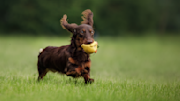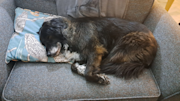Is your dog depressed? The signs you're probably missing

Dachshund pet insurance
Discover why Dachshunds make great pets and why pet insurance is a smart way to protect their health

Dachshund breed overview
Dachshunds, also known as sausage dogs, are small dogs with long bodies and short legs. They were first bred to chase animals like badgers. Today, they are known for being great pets for city life and apartment living. They enjoy playtime and being close to their owners, but they need special care to protect their backs.
Keep reading to learn more about the Dachshund breed and how Co-op Pet Insurance can help you care for your dog’s health and wellbeing.
Dachshund key facts
Lifespan
Dachshunds typically live for 12 years or more.
Size and weight
They are small dogs that come in standard and miniature sizes, weighing between 7 and 14 kilograms.
Coat and colour
Smooth, long-haired, and wire-haired coat varieties in a range of colours.
Exercise needs
They need moderate exercise, ideally 30 to 60 minutes each day.
Shedding and grooming
They shed lightly to moderately and require minimal grooming.
Temperament
They are lively and affectionate, but can be a little stubborn.
Learn more about Dachshunds

They are bold, loyal and a bit stubborn
They're known for their bold personality. They make wonderful companions, but their independent streak can make training a bit tricky. Regular training from an early age helps build good habits and a strong bond.

They love to explore
Dachshunds have a strong instinct to hunt and dig, so regular walks and plenty of playtime are essential to keep them happy and healthy. Pet insurance can help cover any accidents from their adventurous side.

They are small but mighty
Dachshunds are friendly and love being part of the family. But because they are small and have long backs, they need to be picked up carefully, especially around kids. Insurance can help if they get hurt from jumping or rough play.
Common health conditions in Dachshunds
Dachshunds can live long and happy lives, but they are prone to several health conditions. Here are six to be aware of:
Intervertebral disc disease
Intervertebral disc disease is a back problem in dogs where the soft discs between the bones in the spine get damaged. This can press on the spinal cord and cause pain, trouble walking, or even paralysis. It’s more common in dogs with long backs, like Dachshunds.
Obesity
Some dogs are more prone to weight gain, especially if they have a strong appetite or low activity levels. Excess weight can strain the joints and increase the risk of other health problems. A healthy diet and regular exercise are important to keep dogs at a good weight.
Dental disease
Small dogs often have crowded teeth, which can trap food and cause plaque buildup. This can lead to gum disease, tooth loss, and infections. Brushing teeth and regular cleanings at the vet can help keep a dog’s mouth healthy.
Eye problems
Dogs can develop eye issues like cataracts or glaucoma. These can cause cloudy eyes, pain, or blindness. Some eye problems are inherited, while others come with age. Regular vet visits can help catch them early.
Hip dysplasia
Hip dysplasia occurs when the hip joint doesn’t develop properly, leading to a loose or unstable fit. This can cause discomfort, reduced mobility, and difficulty with activities like walking or running.
Epilepsy
This is a brain disorder that causes seizures in dogs. Seizures can look like shaking, drooling, or collapsing. Some dogs have mild episodes, while others may have more serious ones. Medicine can help control it, but dogs usually need treatment for life.
Care tips for owners
Watch their weight
Keep your dog at a healthy weight to protect their back and joints.
Avoid jumping
Use ramps or steps to help them get on furniture and avoid hurting their spine.
Walk every day
Regular walks keep their muscles strong and help prevent weight gain.
Brush their teeth
Clean teeth help prevent gum disease and bad breath.
Check their eyes and ears
Look for signs of redness, discharge or other changes.
Visit the vet regularly
Routine vet visits help monitor ear, eye, and joint health.
Why do you need dog insurance?
Dog insurance is there to cover your dog if they have an accident or illness and will cover the costs of the treatment needed, minus any excesses.
Some of the key reasons to buy dog insurance are:
Cost of vet fees
Vet fees can cost thousands of pounds depending on the type of treatment and the size and breed of your pet.
Peace of mind
Knowing that you are covered for what can be a large unexpected bill.
Lifetime cover
If you choose a lifetime policy, any illnesses or accidents insured will continue to be covered for the whole of your pet's life.
Compare our cover types
Compare the difference between the two types of Co-op Dog Insurance.
|
Cover |
Lifetime |
Time limited |
|---|---|---|
Vet fee cover | up to £16,000 | up to £5,000 |
Lifetime cover for recurring illness
| Lifetime cover for recurring illness included | Lifetime cover for recurring illness excluded |
Dental treatment | Dental treatment included | Dental treatment included |
Third-party liability cover
| Third-party liability cover included | Third-party liability cover included |
Pay monthly at no extra cost | Pay monthly at no extra cost included | Pay monthly at no extra cost included |
Advertising and reward
| up to £2,500 | up to £1,000 |
Loss of pet
| up to £3,000 | up to £1,000 |
Lifetime
Vet fee cover
up to £16,000
Lifetime cover for recurring illness
for example if your pet is insured and you keep renewing, cancer treatment is covered for life
Dental treatment
Third-party liability cover
dogs only
Pay monthly at no extra cost
Advertising and reward
if your pet goes missing
up to £2,500
Loss of pet
due to theft or if they are lost
up to £3,000
Time limited
Vet fee cover
up to £5,000
Dental treatment
Third-party liability cover
dogs only
Pay monthly at no extra cost
Advertising and reward
if your pet goes missing
up to £1,000
Loss of pet
due to theft or if they are lost
up to £1,000
For more details on what is and isn't covered, read our policy documents.





